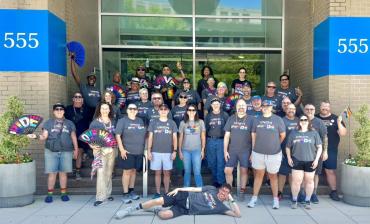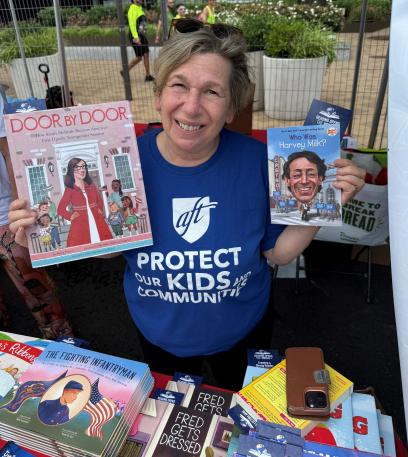It was a jam-packed week of both celebration and serious organizing as the AFT LGBTQIA+ Task Force gathered during World Pride in Washington, D.C., June 5-8. Apart from the annual monthlong Pride celebration, World Pride is held in a different city every other year and known for its exuberant parades, block parties and concerts—as well as workshops, changemaking and advocacy.
While it’s easy (and fun!) to get caught up in rainbow glam and snapping fans—after all, “Joy is a form of resistance,” says Jeff Freitas, task force co-chair, president of the CFT in California and an AFT vice president—there is serious work to be done. “It’s more than a party, it is purpose,” says Maggie Dayvis, a taskforce member, teacher and member of Education Minnesota. “It is action.”
Taking it to the Hill, taking it to the streets
The task force members got right to work, traveling to Capitol Hill to speak with lawmakers about the reconciliation bill they are considering right now, a bill that could cause great harm to working families and especially children. They advocated for LGBTQIA+ rights, protections for trans healthcare and immigrant justice.
To prepare for getting out in the streets for rallies and demonstrations, a security training showed activists how to protect their identification and prevent doxxing (when an activist’s identity and home address are shared without their permission, drawing potential harassment). Another training featured role-playing on how to protest most effectively while still staying safe.
Together we are stronger
Several partner organizations joined the group for a panel discussion about harmful executive orders, state and local policy trends, immigration and identity, and racial justice. Sultan Shakir, chief operating officer at PFLAG (formerly Parents, Families and Friends of Lesbians and Gays) reminded participants that AFT President Randi Weingarten was the first union president to receive the PFLAG National Flag Bearer Award, and that PFLAG was founded by AFT member Jeanne Manford—a teacher and mother “driven to take courageous and loving action when her gay son was viciously and violently attacked.”
Fifty years later, the fight for young LGBTQIA+ people can be discouraging, with legislative bodies often skewed toward people who oppose equity for LGBTQIA+ families. But winning is still possible, said Naomi Goldberg, executive director of the Movement Advancement Project—it may just look a bit different. For example, if a harmful bill never makes it out of committee, that’s a win. Electing a school board member who will “hold the line”? Another win.
While the proliferation of bills preventing access to gender-affirming healthcare is devastating, “We defeated approximately 92 percent of anti-LGBTQ bills on average over the last 15 years,” said Goldberg. “We kill a lot of bills.”
David Stacy, government affairs director at the Human Rights Campaign, painted a bleaker picture, noting that the far right is “coming for all of us, and we have to stick together.” LGBTQIA+ rights are being eroded through the decimation of the civil rights office in the Department of Education—where staffing has been drastically reduced and no complaints are being addressed—and anti-LGBTQIA+ activity is underway in unrelated agencies such as the Department of the Interior and the Department of Defense.
Victoria Kirby York, deputy executive director of the National Black Justice Coalition, attested to the power of pushing back, describing how her organization partnered with other activists to resist the “bathroom bill” in North Carolina. People from different coalitions regularly protested, held advocacy days and spoke with a unified voice, she said. In the end, they were able to repeal the bill. “When we come together, we can do it,” said York.
Immigration also overlaps LGBTQIA+ issues, said Aaron Morris, executive director of Immigration Equality. “Even naturalized U.S. citizens who are LGBTQ are refusing to leave the country because they are afraid they won’t be allowed back in,” he said. He listed the many ways immigrants and visitors are threatened: reopening Guantanamo Bay, targeting student activists and mandating that every undocumented person sign up on a national registry.
The government’s actions are often illegal and may eventually be stopped, but the point, said Morris, is to instill fear and prevent people from speaking out. “If you are a documented person, be the voice for the people who can’t speak out,” he said.
Next gen/this gen
Workshop participants found hope in the stories of the young LGBTQIA+ people on another panel, just as those young people found hope in their interactions with LGBTQIA+ elders modeling how fulfilling their own lives can be.
But the paths of these young people have not been easy: Ray Loux, a trans high school student from Kentucky who is a Human Rights Campaign youth ambassador, said he and his peers are angry about all that has been taken away from them because of their identities as LGBTQIA+. “I lost access to my healthcare, my right to talk about my identity in school, my right to use bathrooms in school,” he said, referring to a Kentucky law attacking trans rights. He has been frustrated by the way he and other young activists have been dismissed, as if they were incapable.
Erica McPheeters, a former Miss Kentucky State University and an intern at the Human Rights Campaign, says Kentucky reduced all diversity, equity and inclusion efforts in the state, wiping out campus women’s week and all the events the LGBTQ club had lined up for the semester.
Skye Tooley, a teacher and a member of United Teachers Los Angeles, is painfully aware of the deaths among trans youth, including Nex Benedict, and they themselves have experienced doxxing. But Tooley is encouraged each time they stand in front of their classroom and see that their students are uplifted by the example Tooley offers, living as a successful, engaged, enthusiastic educator who happens to be trans.
“One of the things that’s really helped me has been mentorship, having gay or trans or queer adults that I can look up to and receive guidance from,” said Loux. “Seeing these mentors go on and be successful and live really fulfilling lives as queer adults is really inspiring and really uplifting.”
The feeling is mutual. “All of you give us hope,” said Weingarten. “This is what our future is, and this is why our future is worth fighting for.”
[Virginia Myers]



